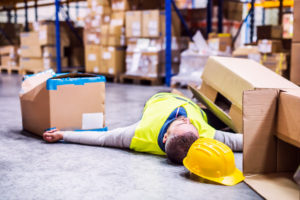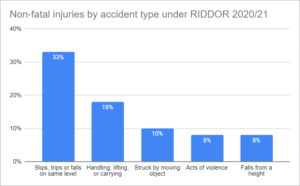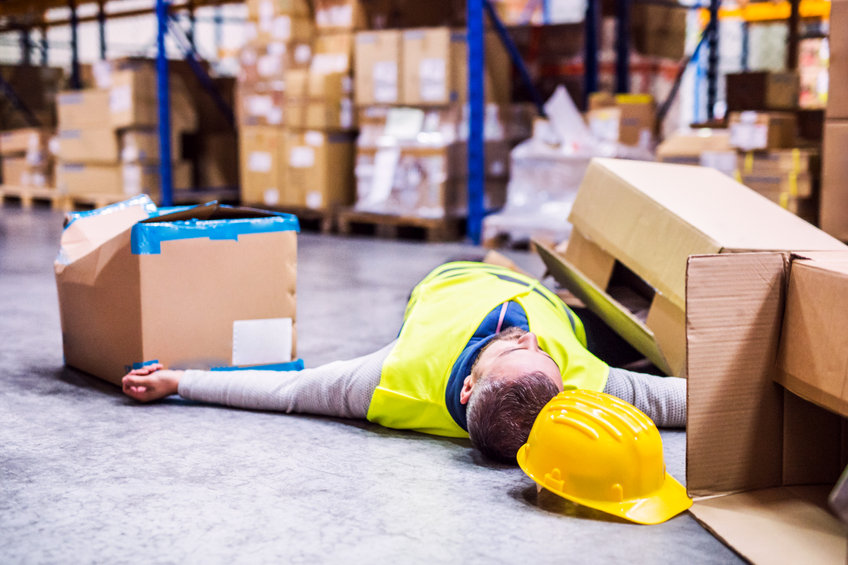 In this guide, we’ll look at the process of making inadequate PPE claims. Your employer has a duty of care towards you while you’re at work. As part of this duty of care, they’re expected to provide you with the Personal Protective Equipment (PPE) that you need to do your job safely.
In this guide, we’ll look at the process of making inadequate PPE claims. Your employer has a duty of care towards you while you’re at work. As part of this duty of care, they’re expected to provide you with the Personal Protective Equipment (PPE) that you need to do your job safely.
If this duty of care is breached, you could be injured as a result. If this is the case, you may be able to claim against your employer.

Our advisors are here to provide you with free legal advice, and they’re available to do so 24 hours a day, 7 days a week. Furthermore, there’s no obligation for you to proceed with us just from getting in touch.
However, they could connect you with a solicitor from our panel to represent you if your claim has a good chance of success. To find out more about how to claim for injuries caused by substandard PPE, read on. You can also get in touch now by:
- Clicking on the banner at the top of this page
- Using our contact form
- Chatting to someone using the live pop-up box in the corner of this screen
Choose A Section
- Why Health And Safety Regulations Are Important
- What Is Personal Protective Equipment (PPE)?
- What Can I Do If My Employer Gives Me Poor Quality PPE?
- Compensation Payouts For Inadequate PPE Claims
- Connect With No Win No Fee Workplace Accident Solicitors
- Learn More About Inadequate PPE Claims
Why Health And Safety Regulations Are Important
Health and safety regulations that apply to workplaces are very important. Some workplaces can pose a real risk of injury or contracting work-related illnesses. For example, the construction or manufacturing industries involve large, heavy pieces of moving machinery. These have the potential to cause injury to workers.
However, it’s not just certain high-risk roles where health and safety in the workplace are important. It’s also important that employers adhere to their duty of care in workplaces such as offices where you might expect fewer risks to safety.
For example, there’s a risk of slipping and falling in an office. This might happen because the flooring is unsuitable or proper housekeeping was not maintained, meaning that an obstruction caused you to fall. However, for the purposes of this guide, we will focus on health and safety in workplaces where PPE may be required.
In workplaces, the Health and Safety at Work etc. Act 1974 (HASAWA) is an important piece of legislation; it outlines the duty of care that employers owe their employees. This duty of care will be discussed in more detail in the section What Can I Do If My Employer Gives Me Poor Quality PPE?.
Furthermore, the Personal Protective Equipment at Work Regulations 1992 goes into the responsibilities of an employer in a bit more detail. For example, it states the guidelines around the assessment, maintenance and use of PPE in workplaces.
Official Accident At Work Statistics
The Health and Safety Executive (HSE) report on non-fatal injuries at work in Great Britain. In total, 51,211 non-fatal injuries were reported through The Reporting of Injuries, Diseases and Dangerous Occurrences Regulations 2013.
The most common of these incidents reported were slips, trips and falls on the same level. These kinds of accidents could potentially be prevented by supplying employees with non-slip shoes where this is applicable.

If your employer’s negligence has led to you being injured and you’d like to learn more about inadequate PPE claims, contact our team today. One of our advisors will be happy to answer any questions you have.
What Is Personal Protective Equipment (PPE)?
Personal protective equipment is important to keep people safe at work. The kind of PPE you require will depend on the role you work in.
For example, you may use:
- Gloves
- Steel toe boots
- Goggles
- Ear protection
- Hard hats
- High-visibility clothing, for example, jackets
PPE is designed to offer protection while working in places where hazards could be present. For example, construction sites are generally noisy places. Ear defenders are useful to avoid the onset of conditions such as tinnitus. Similarly, hard hats and steel toe boots could be used in a construction environment to minimise the impact of heavy loads falling from a height.
Gloves can be used in a variety of settings. For example, if you work with abrasive substances, then gloves could protect your skin from damage.
As you can see, PPE is important. The absence of it could stand to cause severe problems where the personal health of employees is at stake. As such, employers cannot afford to be negligent when it comes to personal protective equipment.
Get in touch with an advisor today if you have been injured as a result of substandard PPE. They can provide you with further in-depth information on inadequate PPE claims.
What Can I Do If My Employer Gives Me Poor Quality PPE?
Previously, we’ve mentioned the Health and Safety at Work etc. Act. This outlines the duty of care that employers owe to their employees.
Part of this duty of care includes providing appropriate PPE, but it can also mean ensuring that good housekeeping is practised. In addition, working machinery should be kept safe and well-maintained.
There are a number of ways an employer can breach this duty of care with respect to PPE. For example, they may provide you with the wrong type of PPE. Furthermore, they might fail to replace or repair PPE even after becoming aware that it’s no longer fit for purpose.
If your employer breaches the duty of care that they owe you, resulting in injury, then you may be able to claim. Injury is essential in making your claim. You cannot be compensated for a lack of appropriate PPE if this did not directly lead to you being injured.
If you want to learn more about inadequate PPE claims, get in touch with an advisor today to learn more. If your claim is valid, an advisor could connect you with a No Win No Fee solicitor from our panel.
What Evidence Do I Need For Inadequate PPE Claims?
To be able to prove that your employer was negligent, you will need to collect evidence to support your claim.
The faulty PPE itself can function as evidence. For example, if you were given goggles to protect you from harmful fumes and the seal around the goggles had deteriorated, then this could support your claim.
Some other forms of evidence that could be used to support your claim include:
- CCTV footage that shows the accident taking place
- Details of any witnesses who saw the incident occur so that a statement can be taken at a later date
- A report from the workplace accident book
- Photographs of the scene of the accident, your injuries or the faulty PPE that led to you being injured.
For more information on useful evidence in inadequate PPE claims, speak to an advisor today. You can get in touch by clicking on the banner below.
 Compensation Payouts For Inadequate PPE Claims
Compensation Payouts For Inadequate PPE Claims
You may be wondering how inadequate PPE claims are valued. To give you a rough idea of how much your claim could be worth, we have provided this table with example compensation payouts from the Judicial College Guidelines.
These figures are based on real-life compensation settlement amounts. However, they may not give you a fully accurate picture of what you could be owed. Your case is different with its own details to consider.
As such, we recommend that you speak with an advisor today to get the most relevant figure possible in relation to your claim.
| Injury | Nature of incident | Possible compensation |
|---|---|---|
| Brain Damage (b) Moderately Severe Brain Damage | Where the injured person has become disabled to a very serious degree. Professional care may be needed, and there could also be a deficit to intellect and personality. Life expectancy may also be reduced. | £205,580 - £264,650 |
| Injuries Affecting Sight (b) Total Blindness | Where vision has been completely impaired, leaving the injured party unable to see. | In the region of £252,180 |
| Deafness/Tinnitus (c) Total Loss of Hearing in One Ear | Here, the injured person may experience headaches and tinnitus, as well as dizziness. | £29,380 - £42,730 |
| Asbestos-Related Disease (a) | Here, mesothelioma will have been sustained which will impede quality of life. This will happen through irritation to the lung lining or the abdominal cavity. Extent of pain, chemotherapy, and radiotherapy will affect award. | £65,710 - £118,150 |
| Neck Injuries (b) Moderate (I) | You would be likely to see dislocations or fractures which might need spinal fusion surgery to repair. There may also be serious soft tissue injuries involved. | £23,460 - £36,120 |
| Back Injuries (b) Moderate (ii) | Where there has been injuries such as ligament disturbance as well as injuries to muscle. There may be issues such as backache, soft tissue injuries and exacerbation of pre-existing injuries. | £11,730 - £26,050 |
| Ankle Injuries | Here, there has been an injury necessitating a long period in a plaster cast. Pins and plates will have also been employed to repair the injury. However, the injured person may find it difficult to walk following this. | £29,380 - £46,980 |
| Toe Injuries (c) Severe Toe Injuries | Where there has been crush injuries to multiple toes, necessitating amputation of at least one. Also includes bursting wounds. | £12,900 - £29,770 |
| Facial Disfigurement (c) Fractures of Nose or Nasal Complex (I) | Where a number of operations have been required to repair multiple fractures; however, the injured party is still left with breathing difficulties as well as damage to tear ducts and nerves. | £9,990 - £21,700 |
| Dermatitis (b) | Where dermatitis has affected one or both hands and continues for a significant period. However, it will settle with treatment and where gloves are used for specific tasks. | £56,180 - £94,470 |
The above table refers to general damages. This is compensation for the pain and suffering your injuries have caused you.
As part of your claim, you’ll be invited to a medical assessment. At this appointment, an independent expert will assess your injuries, confirm that they’re consistent with the accident you were involved in and compile a report with their findings. The report will then be used to value the general damages head of your claim.
Special damages provide compensation for financial losses that your accident has caused you to sustain. For instance, this could be for lost wages or renovations you have had to make to your home to accommodate your injuries. It’s important that you provide evidence of any special damages you’d like to claim back; for example, you could use payslips to support a claim for lost wages.
To find out how much you could receive in general and special damages, speak to an advisor. They can offer free legal advice about inadequate PPE claims and may be able to connect you with a solicitor from our panel.
Connect With No Win No Fee Workplace Accident Solicitors
You may be interested in inadequate PPE claims and may want to start your own claim. However, the thought of extensive legal costs can be a significant barrier for many people. However, there is an option that may help called a No Win No Fee agreement. A Conditional Fee Agreement (CFA) is the kind of No Win No Fee agreement usually used in personal injury claims.
When you fund legal representation with a CFA, it means that:
- You won’t be asked to make any upfront or ongoing fees to your solicitor
- In the event of an unsuccessful claim, there’ll be nothing to pay them.
- If your claim is successful, a small, legally-capped percentage of your compensation will be deducted.
To find out more about how a No Win No Fee agreement could benefit you, speak to an advisor today. They can provide you with free legal advice and can do so 24 hours a day, 7 days a week. They can also connect you with a solicitor from our panel if your claim has a good chance of success.
To find out more, get in touch today. You can do so by:
- Clicking on the banner below
- Using our contact form
- Chatting to someone using the live pop-up box in the corner of this screen
Learn More About Inadequate PPE Claims
Royal Society for the Prevention of Accidents — Anti-accident charity providing guidance and information.
Head injury and concussion — This NHS guide detailing head injuries and associated issues.
Tinnitus — An NHS guide discussing tinnitus and its symptoms.
You can read more of our guides below too:
- NHS Health and Safety Breaches
- Workplace Health and Safety Accident Claims
- Construction Health and Safety
- Learn more about Health and Safety Jobs
- How to make a serious work injury claim
- How to find the best accident at work solicitors
- How do you use an accident at work claim calculator?
- Could I make a No Win No Fee injury at work claim?
- What could increase my chances of winning my work accident claim?
- Could I make a claim if I’m injured at work?
- Is my employer liable for an accident at work?
- Do I need to use work-related claims solicitors?
- Advice on reporting an accident at work
- Calculating the average payout for an accident at work
- Lifting accidents at work
- Do I need to complete an accident at work form?
- How much compensation could I claim for a broken finger at work?
- No health and safety training at work – can I claim for an accident?
- How To Gather Evidence For An Accident At Work Claim
- Gathering Evidence For A Foot Injury At Work Claim
- Steps To Take After Suffering A Hand Injury At Work
- Electric Shock At Work Claims
- Accident At Work Due to Faulty Equipment Claims
- Using An Accident At Work Helpline To Get Advice
- What Can We Learn From Accident At Work Statistics?
- How Do I Report My Injury In An Accident At Work Book?
Thank you for reading our guide to inadequate PPE claims.



